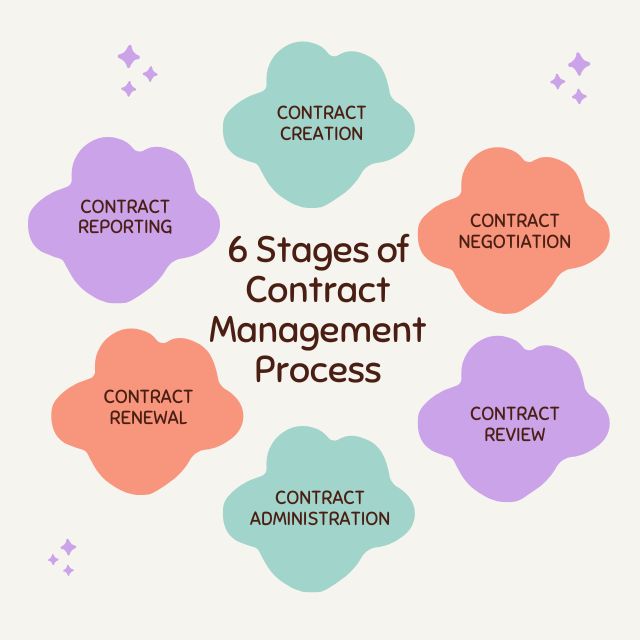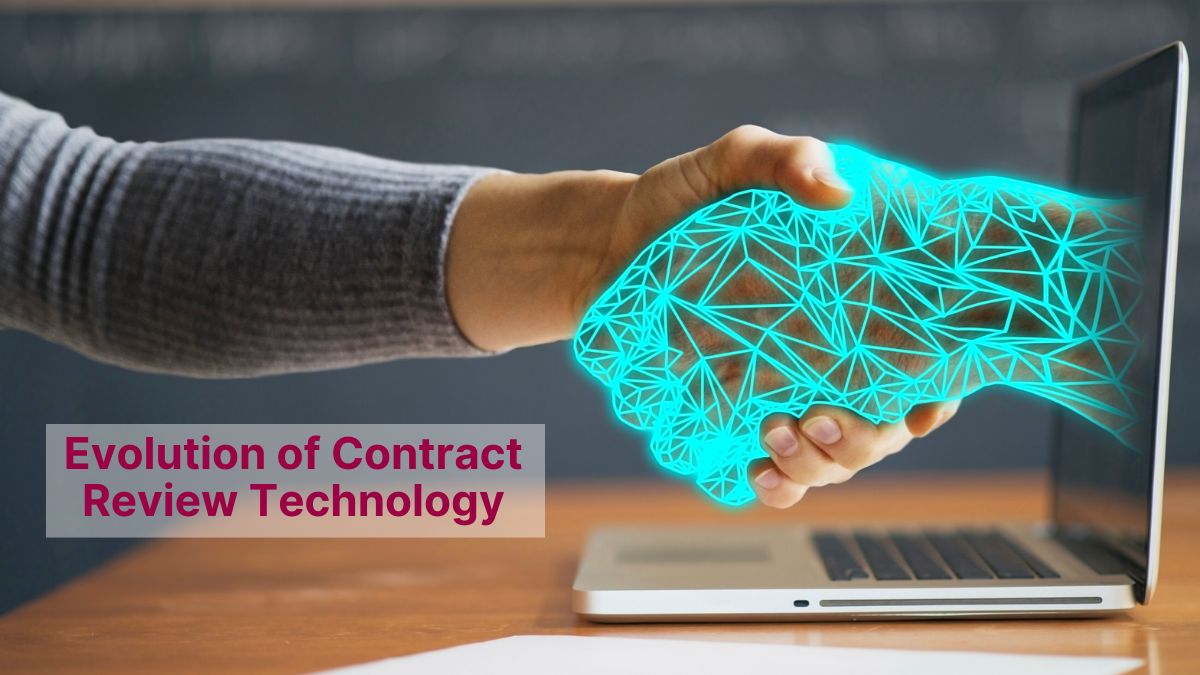What Are The Stages of The Contract Management Process?
Efficient contract management is essential for businesses to ensure compliance, mitigate risks, and drive successful outcomes. The contract management lifecycle consists of six distinct stages that can be broken into creation, negotiation, review, administration, renewal and reporting. In this article, we will explore each stage in detail and discuss how leveraging innovative systems like contract management software solutions can help streamline your processes and enhance overall operational efficiency.

Contract Creation
The contract creation stage involves drafting and structuring agreements that outline the terms and conditions between parties. This stage focuses on capturing the parties’ intent, defining obligations, and establishing legal clarity. Efficient contract creation involves templates, standardized language, and workflows to ensure consistency and minimize errors. Leveraging Legitt AI’s contract automation tools can simplify this stage by generating accurate and customized contracts using pre-defined templates, reducing manual errors, and speeding up the process.
Contract Negotiation and Collaboration
During this stage, parties engage in negotiations to reach mutually acceptable terms. Effective collaboration tools enable real-time document sharing, version control, and communication between stakeholders, expediting the negotiation process. Legitt AI’s collaboration features facilitate seamless collaboration by providing a centralized platform where stakeholders can collaborate, comment, and track changes in real-time, ensuring transparency and efficiency.
You may also like: What is CLM
Contract Review and Approval
The contract review and approval stage involves assessing the terms, verifying contract compliance with internal policies and regulations, and obtaining the necessary approvals. Manual contract review can be time-consuming and error-prone. Leveraging Legitt AI’s AI-powered contract review capabilities can automate the review process, flagging potential risks, highlighting non-compliance issues, and ensuring adherence to established guidelines.
Contract Administration and Execution
Once contracts are reviewed and approved, they need to be properly administered and executed. This stage involves managing contract metadata, organizing document storage, tracking milestones, and coordinating signatures. Legitt blockchain contract management platform offers centralized repositories, automated reminders, and digital signature integration, simplifying contract administration and ensuring smooth execution.
Ongoing Contract Management and Renewal
Contracts require active management throughout their lifecycle to monitor obligations, track key dates, and manage renewals or terminations. Legitt AI’s contract management software ensures automated alerts and notifications for critical contract events, enabling proactive management. It also facilitates easy access to contract data, allowing businesses to evaluate performance, track compliance, and streamline the renewal process.
Contract Reporting and Tracking
Contract reporting and tracking provide valuable insights into contract performance, risks, and opportunities. Legitt AI’s reporting and analytics features offer customizable dashboards, contract metrics, and real-time data visualization, empowering businesses to make informed decisions, identify trends, and optimize implied contract management strategies.
How Legitt AI Can Help Your Business?
Legitt AI offers a comprehensive contract management solution that streamlines the entire contract management lifecycle. Its powerful features, including contract automation, collaboration tools, AI-powered contract review, and reporting capabilities, enable businesses to enhance efficiency, reduce risk, and drive better outcomes. By leveraging Legitt AI’s cutting-edge technology, businesses can save time, reduce manual errors, ensure compliance, and improve decision-making.
Effectively managing contracts throughout their lifecycle is crucial for organizations to optimize operations, mitigate risks, and drive success. The six stages of the contract management lifecycle, from creation to tracking, provide a framework for systematic and efficient contract management. By embracing innovative solutions like Legitt AI, businesses can streamline their contract management processes, improve collaboration, ensure compliance, and gain valuable insights. Embracing technology-driven contract management solutions can transform contract management from a burdensome task into a strategic advantage, enabling businesses to focus on core activities, enhance productivity, and maximize value from their contracts.
With Legitt AI’s user-friendly interface and advanced features, businesses can experience numerous benefits, including:
Time and Cost Savings: By automating contract creation, review, and administration processes, businesses can significantly reduce the time and effort spent on manual tasks. This frees up resources and allows employees to focus on more strategic and value-added activities.
Enhanced Collaboration and Communication: Legitt AI’s collaboration tools facilitate seamless communication and real-time document sharing among stakeholders. This improves collaboration, eliminates version control issues, and enables faster decision-making during contract negotiation and approval stages.
Risk Mitigation and Compliance: Legitt AI’s AI-powered contract review capabilities help identify potential risks, non-compliance issues, and discrepancies in contracts. This reduces the chances of costly legal disputes and ensures adherence to internal policies and regulatory requirements.
Improved Visibility and Reporting: Legitt AI’s reporting and tracking features provide comprehensive insights into contract performance, obligations, and key dates. This enables businesses to make data-driven decisions, track milestones, and identify opportunities for optimization and cost savings.
Seamless Renewals and Terminations: With Legitt AI’s automated alerts and notifications, businesses can proactively manage contract renewals and terminations. This ensures contracts are properly evaluated, renewed in a timely manner, or terminated as needed, preventing unnecessary renewals and potential risks.
Scalability and Flexibility: Legitt AI’s contract management solution is designed to accommodate the evolving needs of businesses. It can easily scale with your organization’s growth and adapt to changing contract management requirements, ensuring long-term usability and value.
Conclusion
In conclusion, effective contract management is vital for businesses to mitigate risks, ensure compliance, and optimize value from their contracts. The six stages of the contract management lifecycle, combined with the advanced features of Legitt AI, empower businesses to streamline their processes, enhance collaboration, reduce risk, and drive better outcomes. By leveraging technology-driven solutions, businesses can transform contract management from a time-consuming and manual process into a strategic advantage that positively impacts their bottom line.
Did you find this Legitt article worthwhile? More engaging blogs about smart contracts on the blockchain, contract management software and electronic signatures can be found in the Legitt Blogs section. You may also contact Legitt to hire the best contract lifecycle management services and solutions along with free contract templates.
Frequently Asked Questions About Contract Management Process
How can contract management software benefit my business?
Contract management software, such as Legitt AI, streamlines processes, saves time, enhances collaboration, mitigates risks, ensures compliance, provides insights, and improves decision-making.
What is the role of contract creation in the contract management lifecycle?
Contract creation involves drafting agreements with defined terms and conditions, capturing parties' intent, and setting the foundation for a legally binding contract.
How does contract management software facilitate contract negotiation and collaboration?
Contract management software enables real-time document sharing, version control, and communication among stakeholders, expediting the negotiation process and ensuring transparency.
How can contract review and approval be streamlined with technology?
Contract management software with AI-powered review capabilities automates the review process, identifies risks, highlights non-compliance issues, and ensures adherence to guidelines.
What is the importance of contract administration and execution?
Contract administration involves managing metadata, organizing document storage, tracking milestones, and coordinating signatures to ensure smooth execution and compliance.
How does ongoing contract management and renewal contribute to business success?
Ongoing contract management allows businesses to monitor obligations, track key dates, and proactively manage renewals or terminations, optimizing performance and minimizing risks.
What role does contract reporting and tracking play in contract management?
Contract reporting and tracking provide valuable insights into contract performance, risks, and opportunities, enabling informed decision-making and optimization of contract management strategies.
How can Legitt AI help businesses ensure compliance and reduce risk?
Legitt AI's advanced features, such as AI-powered contract review and automated alerts, help identify risks, flag non-compliance issues, and ensure adherence to regulations.
Can contract management software be customized to meet specific business needs?
Yes, contract management software like Legitt AI offers customization options to accommodate unique business requirements, ensuring scalability and flexibility.
How does contract management software improve efficiency and productivity?
Contract management software automates manual tasks, reduces errors, centralizes data, provides easy access to information, and enhances collaboration, leading to increased efficiency and productivity.





















